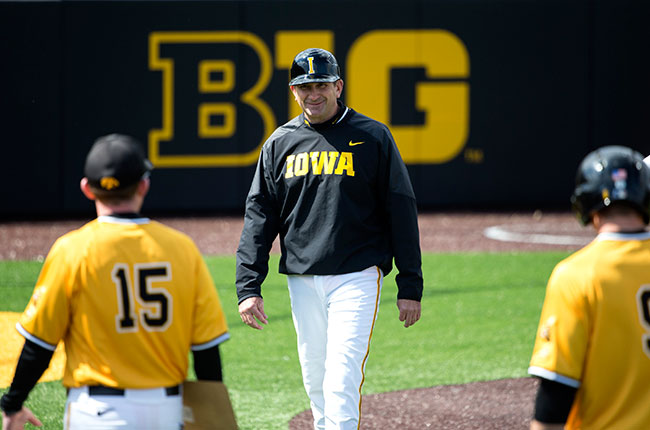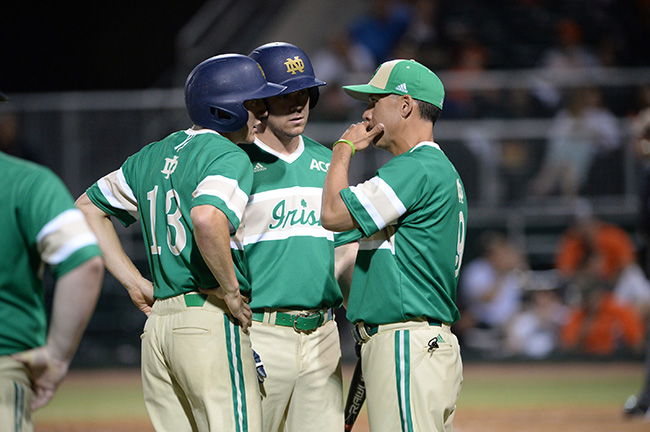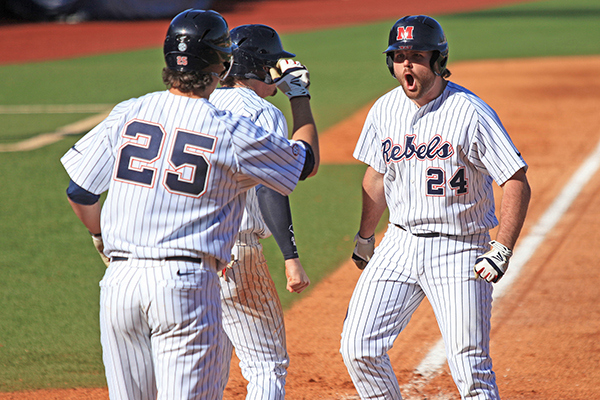
Photos by Brian Ray - hawkeyesports.com
What a 2015 season it was for Iowa. Under head coach Rick Heller, the Hawkeyes went 41-18, finished 19-5 in Big Ten play (in a much-improved Big Ten, mind you), and they made some noise in the Springfield regional once they got to the postseason.
Given their relative lack of history, it was a startling turn of events. Now, their challenge is to build on the 2015 season and turn the program into a consistent winner, which won’t be easy in the Big Ten, suddenly an upper echelon baseball league.
Recently, I had the chance to chat about that very challenge, among a number of other topics, with RossWB (@RossWB on Twitter) of Black Heart Gold Pants, Iowa’s SB Nation community. Ross follows the Iowa baseball program as closely as anyone, and he was able to eloquently put into words what it was like to follow the team’s outstanding 2015, how they plan to sustain their newfound success, and the prospects of Rick Heller putting down roots in Iowa City.
Below is our full Q&A.
Joseph Healy: The 2015 season was obviously quite a ride for the Iowa baseball program. How has the success from this past season changed the culture of the program and how the program is supported locally?
RossWB: It’s been an absolutely extraordinary transformation. Baseball was a bit of a non-entity at Iowa for a long time before this season. It drew a few hundred people and a little coverage here and there — more of both when they put together a hot streak and won a few games or contended for a spot in the Big Ten Tournament. That changed in a big way this year. Fans flocked to the games, especially once Big Ten play started and they proved that their hot start was no fluke. They had 2500 people at the series finale against Nebraska. That’s probably not a big figure for some of the more popular and established baseball programs, but at Iowa? It’s huge.
Fans really embraced this team in a big way. They were fun to watch and won a lot of games, often in exciting fashion. The local media really stepped up their coverage of the team as well; in years past The Gazette and the Iowa City Press-Citizen might have provided cursory coverage of the team and their games, but once they started wining consistently, they started doing more feature articles and bigger and better game recaps. It was an absolute blast to see the way the culture around Iowa baseball changed and how people embraced it.
JH: What’s the feeling about the team being able to back up the 2015 season with success in 2016 and beyond?
RWB: I think there’s a sense that Iowa may need to take a step back in 2016, but that the overall future is very bright. A lot of things clicked into place for Iowa in 2015 and it made for a remarkable season, but not necessarily one that will be easy to duplicate. Iowa won a lot of games with pitching, defense, and clutch hitting — getting repeat performances in those areas won’t be easy. Iowa also loses a lot of seniors from the 2015 team: Eric Toole, Jake Manger, Kris Goodman, Nick Day, and Dan Potempa were pretty much fixtures in the Iowa lineup and among their best hitters. Iowa also loses two of their key pitchers, junior Blake Hickman, who was taken in the 7th round of the MLB Draft, and senior Nick Hibbing, a lights-out closer who was also drafted.
The good news is that Iowa is bringing in the Big Ten’s best recruiting class in 2015 and has recruited well overall in the last few years. They also return Tyler Peyton, one of their best hitters AND one of their best pitchers, as well as Calvin Mathews, who led Iowa in ERA last year (2.45). Still, there will be a lot of new bats in the lineup and some new faces will need to emerge in the rotation and the bullpen.I think this team will have talent, but it won’t have much experience. As such, I expect them to go through some growing pains in 2016. I think those pains will really pay off in 2017 and beyond, though.
JH: For the 2016 Hawkeyes to be as good or nearly as good as the 2015 edition, what would have to go right?
RWB: I think they need their hitting to take a pretty big step forward. Pitching and defense led the way for Iowa in 2015, but I’m not sure it’s realistic for Iowa to try and win like that in 2016. As noted, the pitching staff is going to have to replace Hickman, one of their best starters, and Hibbing, their best reliever. The defense was one of the best in the nation in 2015, but with so many seniors departing, Iowa’s going to be sending some much less experienced fielders onto the field in 2016. Some regression on defense is likely inevitable.
The one area where Iowa could definitely stand to improve is on offense. They were mediocre (at best) in most offensive categories and particularly struggled to hit for power; small-ball can carry you pretty far in college baseball, but it’s also pretty nice to have some pop to bail your offense out at times, too. Iowa will have a lot of new faces in the lineup, which could be a positive because we knew what a lot of Iowa’s previous hitters brought to the table and it wasn’t necessarily the most sizzling offensive stats. The new bats are fairly unknown, but they bring with them some hope. On the other hand, they’re also going to need to acclimate to facing college pitching, which could take some time. But overall, offense is definitely an area where Iowa could improve in 2016 — and it’s an area that they’ll probably need to show improvement in order to maintain the team success they enjoyed in 2015.
JH: Rick Heller is quickly developing a reputation as a turnaround artist in college baseball coaching circles. Obviously, only Rick Heller knows what Rick Heller’s career goals and aspirations are, but what is your feeling about his interest in sticking around Iowa City for the long haul?
RWB: I think one of the biggest concerns for Iowa baseball (and the Big Ten as a whole; see below) is their ability to hang on to talented coaches. Luckily, I also think Iowa is pretty well-positioned to keep Heller long-term. Heller is an Iowa native and most of his playing and coaching career has been spent in Iowa. He played (and briefly coached) at Upper Iowa University before taking over at Northern Iowa and leading their program until they discontinued support for the sport. Outside of a brief (and successful) spell at Indiana State, Heller’s spent his entire career living and working in Iowa. At Iowa, he has the chance to build an in-state program (the only major in-state program left, in fact) and do so at a place with more resources than he’s ever had at his previous jobs. You never say never, so if a big school makes him a Godfather offer that he just can’t turn down, then sure — I could see him leading another team. Barring something like that, though, I think he’ll be leading the Hawkeyes for quite a while.
JH: It wasn’t just a big 2015 season for Iowa. Rather, it was a banner year for Big Ten baseball as a whole. What was the tipping point in turning this league into a top-notch baseball league?
RWB: This was a fantastic year for Big Ten baseball, without a doubt, but I think it will take a few more years like that for the league to break into top-notch baseball league territory. The weather advantages that teams in the south and west enjoy over teams in the Big Ten isn’t going away, nor is their proximity to talent or their ability to recruit said talent. That said, I am pretty hopeful that the recent Big Ten baseball renaissance is more than just a flash in the pan. The success of the Big Ten Network has left Big Ten teams fairly flush with cash and after making the usual improvements to football and basketball facilities and coaching salaries, they’ve gotten around to addressing baseball now, too. And Big Ten teams now have much better baseball facilities and more competitive salaries than they have in the past, and that’s essential for the continued improvement of Big Ten baseball. I think the key for Big Ten baseball’s future will be the ability of B1G teams to hold on to the coaches that have brought them to this success. Tracy Smith led Indiana baseball to incredible success a few years ago, but he couldn’t resist Arizona State when they came calling a season ago. Will other Big Ten coaches follow his path to splashier jobs with teams in the south and west? If so, it’s going to be very hard for Big Ten baseball to continue its recent momentum.



